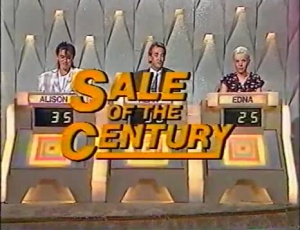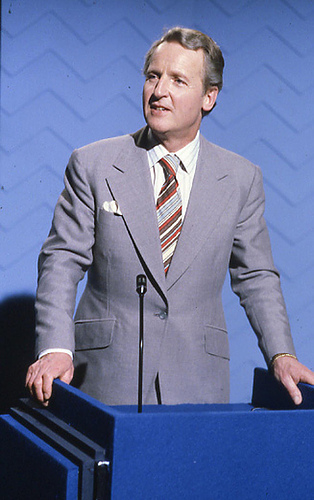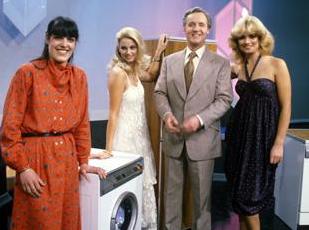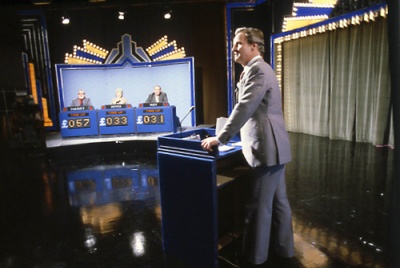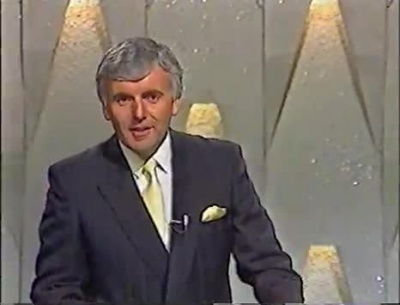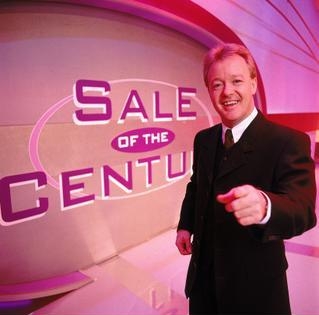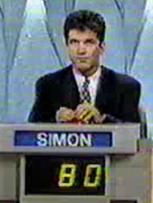Sale of the Century
(→Synopsis) |
|||
| (91 intermediate revisions not shown) | |||
| Line 1: | Line 1: | ||
| - | <div class="image"> | + | <div class="image">[[File:Sale of the century 1989 break bumper.jpg|300px]]</div> |
<div class="box"> | <div class="box"> | ||
| + | |||
== Host == | == Host == | ||
| - | Wilfred Pickles | + | [[Wilfred Pickles]] (non-broadcast pilot) |
| + | |||
| + | [[Nicholas Parsons]] (1971-83) | ||
| - | [[ | + | [[Steve Jones (1)|Steve Jones]] (1981 celebrity special) |
| - | [[Peter Marshall]] ( | + | [[Peter Marshall]] (1989-91) |
| - | [[Keith Chegwin]] | + | [[Keith Chegwin]] (1997-98) |
| - | [[Ant McPartlin|Ant]] & | + | [[Ant McPartlin|Ant]] & [[Declan Donnelly|Dec]] (2005 special) |
== Co-hosts == | == Co-hosts == | ||
| - | Hostesses included: Sophie Batchelor | + | Hostesses included:<br> |
| + | Linda Hooks (1977)<br> | ||
| + | Angela Daniels (1977)<br> | ||
| + | Sneh Gupta (1977)<br> | ||
| + | Tina Robinson (1977-8)<br> | ||
| + | Sophie Batchelor (1978)<br> | ||
| + | Eunice Denny (1978)<br> | ||
| + | Laura Beaumont (1978)<br> | ||
| + | Caro Greenwood (1978)<br> | ||
| + | Christine Owen (1978)<br> | ||
| + | Caroline Villiers (1978)<br> | ||
| + | Carole Ashby (1983)<br> | ||
| + | Karen Loughlin (1983)<br> | ||
| + | Jennifer Cresswell | ||
| - | + | Voiceover:<br> | |
| + | Peter Marshall (1971-72)<br> | ||
| + | [[John Benson]] (1972-83)<br> | ||
| + | [[Mitch Johnson]] (1989: early shows)<br> | ||
| + | Martin Buchanan (1989-91: later shows)<br> | ||
| + | [[Robin Houston]] (1997-98) | ||
Organist: Peter Fenn (original version) | Organist: Peter Fenn (original version) | ||
| Line 24: | Line 45: | ||
== Broadcast == | == Broadcast == | ||
| - | Anglia | + | Anglia for ITV, 9 October 1971 to 13 November 1983 (411 episodes in 11 series) |
| - | + | ||
| - | + | (but see [[Sale of the Century#Regional broadcast details|Regional broadcast details]] below) | |
| - | + | Reg Grundy Productions for Sky Channel, 6 February 1989 to 3 October 1991 | |
| - | + | Reg Grundy Productions for Challenge TV, 3 February 1997 to 1998 (2 series) | |
| + | |||
| + | Granada and Thames for ITV1, 8 October 2005 (''[[Gameshow Marathon]]'' one-off) | ||
</div> | </div> | ||
| Line 41: | Line 63: | ||
The whole concept of Sale of the Century was that all the prizes had been "discounted" to absurdly low prices (normally about 10% of the stated full price, seemingly). Three Members Of The Public answered questions with cash for each correct answer. Throughout the game there'd be "bargains" displayed which the contestants could buzz in for and trade some of their cash for, plus at the end of the first part an "Open Sale" for everyone to make choices from. The contestant with the most money when the gong sounded at the end would go into the titular sale, where they could spend the money they'd earned on the big prizes. | The whole concept of Sale of the Century was that all the prizes had been "discounted" to absurdly low prices (normally about 10% of the stated full price, seemingly). Three Members Of The Public answered questions with cash for each correct answer. Throughout the game there'd be "bargains" displayed which the contestants could buzz in for and trade some of their cash for, plus at the end of the first part an "Open Sale" for everyone to make choices from. The contestant with the most money when the gong sounded at the end would go into the titular sale, where they could spend the money they'd earned on the big prizes. | ||
| - | <div class="image">[[Image:Saleofthecentury parsons.jpg]]''Nicholas Parsons - because you can never too much blue''</div> | + | <div class="image">[[Image:Saleofthecentury parsons.jpg]]''Nicholas Parsons - because you can never have too much blue''</div> |
| - | In its day, Sale Of The Century was one of the richest quizzes on television, with the lucky winner going home with a new dining room suite, a car, a holiday or a television if they'd played their cards right. The "bargains" offered throughout the show would normally be Hoovers and the like (although one was a job lot of car tyres) and the Open Sale, aka Bargain Basement, was full of unexciting stuff like LPs and electric blankets that couldn't be stuck in any of the prize packages. And the losing contestants got to take home all the money they had left too ("That's your two pounds to do anything you'd like with"). Indeed, so big were the prizes that the IBA once formally warned them for "gloating over their high value" too much, which was | + | In its day, Sale Of The Century was one of the richest quizzes on television, with the lucky winner going home with a new dining room suite, a car, a holiday or a television if they'd played their cards right. The "bargains" offered throughout the show would normally be Hoovers and the like (although one was a job lot of car tyres) and the Open Sale, aka Bargain Basement, was full of unexciting stuff like LPs and electric blankets that couldn't be stuck in any of the prize packages. And the losing contestants got to take home all the money they had left too ("That's your two pounds to do anything you'd like with"). Indeed, so big were the prizes that the IBA once formally warned them for "gloating over their high value" too much, which was considered the height of vulgarity. |
<div class="image">[[Image:Saleofthecentury_parsons_hostesses_washingmachine.jpg]]''You don't get a bargain like this down at Rumbelows''</div> | <div class="image">[[Image:Saleofthecentury_parsons_hostesses_washingmachine.jpg]]''You don't get a bargain like this down at Rumbelows''</div> | ||
| Line 51: | Line 73: | ||
Make no mistake, the concept of Sale Of The Century is a right cracker - a fortnight in Spain for three quid? Bring it on! For the most part it meant that the contestants were seen to earn their prizes, which isn't always the case on quizzes. The show also rattled through a decent number of questions, thanks to Nick's machine gun-esque hurried delivery. It put Anglia - and of course Norwich when they mentioned it in the opening announcement - firmly on the map, and it was a huge hit in its day; indeed, it still holds the record as the most watched quiz show ever (for reasons we'll come to later). It was a big deal at the time, too, with much bigger and better prizes compared to its contemporaries, and it simply oozed class thanks to Nick's exquisite tailoring, refined accent and florid turn of phrase ("One of the following is not a blue cheese. I wonder, would you tell me which one that is?"). We'd also like to mention the brilliant title sequence to the first few series of the show - ancient stock footage of a department store sale (including brilliant sign "Oddments Reduced") followed by frantic cuts between the two biggest prizes, then Nick bounding down the stairs to a flourish on the organ and being handed his microphone by a child in the front row. Now that's excitement. | Make no mistake, the concept of Sale Of The Century is a right cracker - a fortnight in Spain for three quid? Bring it on! For the most part it meant that the contestants were seen to earn their prizes, which isn't always the case on quizzes. The show also rattled through a decent number of questions, thanks to Nick's machine gun-esque hurried delivery. It put Anglia - and of course Norwich when they mentioned it in the opening announcement - firmly on the map, and it was a huge hit in its day; indeed, it still holds the record as the most watched quiz show ever (for reasons we'll come to later). It was a big deal at the time, too, with much bigger and better prizes compared to its contemporaries, and it simply oozed class thanks to Nick's exquisite tailoring, refined accent and florid turn of phrase ("One of the following is not a blue cheese. I wonder, would you tell me which one that is?"). We'd also like to mention the brilliant title sequence to the first few series of the show - ancient stock footage of a department store sale (including brilliant sign "Oddments Reduced") followed by frantic cuts between the two biggest prizes, then Nick bounding down the stairs to a flourish on the organ and being handed his microphone by a child in the front row. Now that's excitement. | ||
| - | + | <div class="image">[[File:Saleofthecentury daphnefowler winningcar2.jpg|400px]]''[[Daphne Fowler]] (then Daphne Hudson) wins the car''</div> | |
| - | + | Really, your entire opinion of Sale Of The Century depended on your opinion of Nicholas Parsons, as he dominated the show from start to finish. That's because as well as asking the questions, he also took it upon himself to provide a running commentary on every aspect of the show, always telling viewers why he was doing a particular thing ("I read out the contestants' scores because although they know how well they're doing, they don't always know about their opponents' scores, and they need to know!"), badgering the contestants into buzzing in ("Any good East Anglian should know this!"), and launching into lengthy and effusive praise over each of the prizes (when nobody wanted to buy the tyres on offer, Nick spent ages moaning about how good they were). During the final big sale, he spent ages talking rubbish about each prize, like an embryonic QVC presenter, even when the contestant clearly didn't want it or couldn't afford it - most famously "Would you like a mink coat, Elizabeth? I say, would you like a mink coat, Elizabeth! Would you!?!". | |
| - | Indeed, this | + | Indeed, this sums up the major flaw in the format - Elizabeth couldn't have the mink coat, or any of the other prizes, as she didn't have enough money to buy them, thus meaning she had to come back the following week, and rendering the entire last five minutes of the show completely pointless - not that Nick didn't go through the whole spiel anyway, asking Elizabeth's opinion on prizes she would never have. The contestants were normally so miserable they could never be arsed bidding for any of the prizes, so Nick would just gabble his way through another thousand questions, horrified at there being more than one second of silence on the show. It also seemed that all the cash that had gone on the prizes had been taken out of the show's production budget, with no time or money for retakes, meaning if Nick cocked up, it stayed in - hence, "Women sometimes had their hair cut in... sorry, no! Er, who wrote a symphony..." Eh? |
<div class="image">[[Image:Saleofthecentury onset.jpg|400px]]''Often Parsons preferred to present the show from a neighbouring county''</div> | <div class="image">[[Image:Saleofthecentury onset.jpg|400px]]''Often Parsons preferred to present the show from a neighbouring county''</div> | ||
| - | One bizarre aspect of the show was that the price of prizes was often given in pounds and pence, but the scoring system couldn't cope with pence, so it was always rounded up or down to the nearest pound - so why bother with prizes in pence in the first place? Meanwhile, we still haven't worked out whether the mink coat episode from 1972 that seems to be one of the few still in existence (hence why it's wheeled out on all the clip shows) came when the | + | One bizarre aspect of the show was that the price of prizes was often given in pounds and pence, but the scoring system couldn't cope with pence, so it was always rounded up or down to the nearest pound - so why bother with prizes in pence in the first place? Meanwhile, we still haven't worked out whether the mink coat episode from 1972 that seems to be one of the few still in existence (hence why it's wheeled out on all the clip shows) came when the show was originally supposed to be a regional show - Nick announces that the contestants all come from the region, seemingly bigging up the local aspect, though it appeared to have been at least part-networked at the time. So God alone knows what viewers outside the Anglia region made of it all. |
=== Schedule spotting === | === Schedule spotting === | ||
| - | + | The programme was originally supposed to be a regional show on Anglia, but since 8 January 1972 it spread to other regions such as ATV, where it was on Saturday teatimes. Some of the northern ITV stations held out longer, preferring to air Yorkshire's [[The Sky's the Limit]], but ''Sale'' was aired across nearly the whole network by the end on 10 May 1975, when it made the Top 20 ratings for the first time. Then it tended to flit around Friday (ITV's favoured quiz slot) and Saturday evenings, although some regions bunged it out nearer teatime. By 1976 it was topping the ratings, with regular outings on Christmas Day and Bank Holidays. The episode broadcast on Friday 22nd December 1978 remains not only ITV's highest-rated quiz show ever, but also one of the highest-rated programmes of any kind, with an audience of 21.2 million people. However, the BBC were on strike at the time, meaning it was Nick or nothing. | |
After this high water mark, the programme went into something of a decline, with ratings dropping and the whole thing looking pretty archaic and unsophisticated compared with more modern series like [[3-2-1]] and [[Play Your Cards Right]], and it ended in 1983 - a year before a rather different price-based quiz show, [[The Price is Right]], which was light years away from Nick and his tupperware. | After this high water mark, the programme went into something of a decline, with ratings dropping and the whole thing looking pretty archaic and unsophisticated compared with more modern series like [[3-2-1]] and [[Play Your Cards Right]], and it ended in 1983 - a year before a rather different price-based quiz show, [[The Price is Right]], which was light years away from Nick and his tupperware. | ||
| + | |||
| + | ===The Sky's The Limit=== | ||
| + | |||
| + | ''Sale of the Century'' was one of the cornerstones of The Sky Channel when it relaunched in 1989. [[Peter Marshall]] took the host's podium, and there were a few differences to the version from Norwich. All questions were worth £5, and only the show's leader was invited to buy in the various instant sales. | ||
| + | |||
| + | Three times during the show, Peter read out a longer question, beginning "Who or what am I?" and describing a single answer. This style of question, and the fact Peter had an Irish burr, was reminiscent of Henry Kelly on [[Going for Gold]]. A correct answer to these longer questions allowed the contestant to pick from nine options - some held actual prizes, others carried money for the game. | ||
| + | |||
| + | The contest ended with a timed round, an on-screen display ticked down 60 seconds of rapid-fire questions. Then the winner was invited to spend their winnings on one of the larger prizes, or to bank them and come back the next day. It's the only way they could afford the show's star prize of a brand new car, that needed at least five daily wins. | ||
| + | |||
| + | <div class=image>[[File:Sale of the century 1989 peter marshall.jpg|400px]]''[[Peter Marshall]]''</div> | ||
===The Cheggers Years=== | ===The Cheggers Years=== | ||
| Line 73: | Line 105: | ||
We trotted through the rounds at a fair pace. Round one had eight £1 questions. Round two had eight £3 questions, as did round three. Round four had eight £5 questions, but here the questions were reasonably difficult, as opposed to the first few rounds which were all definite jump-ins. Round five had ten £5 five-pound questions, and the last round had 60 seconds' worth of questions for £5 questions of variable difficulty. | We trotted through the rounds at a fair pace. Round one had eight £1 questions. Round two had eight £3 questions, as did round three. Round four had eight £5 questions, but here the questions were reasonably difficult, as opposed to the first few rounds which were all definite jump-ins. Round five had ten £5 five-pound questions, and the last round had 60 seconds' worth of questions for £5 questions of variable difficulty. | ||
| - | <div class="image">[[Image:Sale_of_the_century_doors.jpg | + | <div class="image">[[Image:Sale_of_the_century_doors.jpg]]''[[Keith Chegwin]]''</div> |
| - | + | ||
| - | '' | + | |
After each of the first five rounds, you got an instant bargain - a discounted prize which any player could "buy" by buzzing in. A typical show's prizes might be: | After each of the first five rounds, you got an instant bargain - a discounted prize which any player could "buy" by buzzing in. A typical show's prizes might be: | ||
| Line 97: | Line 127: | ||
Looking at it now, Sale Of The Century is a bloody nightmare of a programme, with Nick gabbling furiously trying to fill the void where the contestants' personalities should have been. At the time, though, it was a killer of a series, with contestants leaving with armfuls of prizes of the like never seen before on television. It's also great to see a company like Anglia battling above its weight and producing a durable and popular series that burrowed itself into the public's consciousness. But they were simpler times and now it all looks fairly ridiculous. | Looking at it now, Sale Of The Century is a bloody nightmare of a programme, with Nick gabbling furiously trying to fill the void where the contestants' personalities should have been. At the time, though, it was a killer of a series, with contestants leaving with armfuls of prizes of the like never seen before on television. It's also great to see a company like Anglia battling above its weight and producing a durable and popular series that burrowed itself into the public's consciousness. But they were simpler times and now it all looks fairly ridiculous. | ||
| - | ==Key moments== | + | == Key moments == |
One of the hostesses in the Peter Marshall version corpsed in this outtake during an Instant Sale advertising a food processor: "Get rid of your grater, part with your peeler, and chuck your chopper because..." | One of the hostesses in the Peter Marshall version corpsed in this outtake during an Instant Sale advertising a food processor: "Get rid of your grater, part with your peeler, and chuck your chopper because..." | ||
| Line 103: | Line 133: | ||
== Catchphrases == | == Catchphrases == | ||
| - | " | + | "And now, from Norwich, it's the quiz of the week!" - delivered by [[John Benson]] who also did the voice-overs on Anglia stablemate [[Gambit]] at the same time. |
== Inventor == | == Inventor == | ||
| - | Devised by Al Howard (see also: ''[[Supermarket Sweep]]'') | + | Devised by Al Howard (see also: ''[[Supermarket Sweep]]'') |
== Theme music == | == Theme music == | ||
| - | + | Called "Joyful Pete" (in tribute to the show's original producer, Peter Joy) and composed by Peter Fenn. | |
| - | + | ||
| - | + | ||
== Trivia == | == Trivia == | ||
| Line 119: | Line 147: | ||
The Independent Television Authority watchdog reprimanded the programme in 1971 because it thought the show ''"gloated over the high value of its prizes too much".'' | The Independent Television Authority watchdog reprimanded the programme in 1971 because it thought the show ''"gloated over the high value of its prizes too much".'' | ||
| - | Originally, the programme was limited to prizes under £1000. When the show started this was no problem because around 15 models of cars cost under that amount. However, four years later inflation had caught up and only four or five models of cars were available. The newspapers took the show to task, tutting that the star prize was always a foreign car. Anglia explained the situation, and so this because a catalyst for the limit to be upped to £2,500 over three weeks. One week the car was a Lada - one of the first in the country - and he pulled the door | + | Originally, the programme was limited to prizes under £1000. When the show started this was no problem because around 15 models of cars cost under that amount. However, four years later inflation had caught up and only four or five models of cars were available. The newspapers took the show to task, tutting that the star prize was always a foreign car. Anglia explained the situation, and so this because a catalyst for the limit to be upped to £2,500 over three weeks. One week the car was a Lada - one of the first in the country - and he pulled the door off in rehearsal. Parsons made light of Ladas so much that he can be credited with starting the tranche of jokes about them. |
An all-out strike at the BBC on 22nd December 1978 meant that 21.2 million viewers watched the programme, the highest ever rating for an ITV game show. | An all-out strike at the BBC on 22nd December 1978 meant that 21.2 million viewers watched the programme, the highest ever rating for an ITV game show. | ||
| Line 125: | Line 153: | ||
When the original programme stopped in 1983, it had collectively awarded 500 contestants over £500,000 in prizes. | When the original programme stopped in 1983, it had collectively awarded 500 contestants over £500,000 in prizes. | ||
| - | Celebrity editions were run occasionally, with the prizes won going to nominated charities. One example from 1981 featured [[Tom O'Connor]], [[Nicholas Parsons]] and [[Derek Batey]] as contestants. | + | Celebrity editions were run occasionally, with the prizes won going to nominated charities. One example from 1981 featured [[Tom O'Connor]], [[Nicholas Parsons]] and [[Derek Batey]] as contestants with [[Steve Jones (1)|Steve Jones]] as the host. |
<div class="image">[[Image:Sale of the century cowell.jpg]]''He'll never make it in showbusiness.''</div> | <div class="image">[[Image:Sale of the century cowell.jpg]]''He'll never make it in showbusiness.''</div> | ||
| Line 139: | Line 167: | ||
Countless thousands of programmes have been made of this show. Given the consumerist nature of the format (earn cash, spend money on vastly-discounted prizes), it's not surprising that the original format came from America. The industry juggernaut we call Grundy Television took the format over to Australia, where it debuted in 1980. The highest amount ever won by a single contestant was in 1992 when a 26-year-old university student scooped AUS$676,790, which included a $508,000 cash jackpot - a record win for a quiz show in Australia. Students, eh? | Countless thousands of programmes have been made of this show. Given the consumerist nature of the format (earn cash, spend money on vastly-discounted prizes), it's not surprising that the original format came from America. The industry juggernaut we call Grundy Television took the format over to Australia, where it debuted in 1980. The highest amount ever won by a single contestant was in 1992 when a 26-year-old university student scooped AUS$676,790, which included a $508,000 cash jackpot - a record win for a quiz show in Australia. Students, eh? | ||
| - | The ''Gameshow Marathon'' remake was dedicated to Ronnie Barker, somewhat bizarrely as he never hosted any gameshows, let alone ''Sale''. | + | The ''Gameshow Marathon'' remake was dedicated to Ronnie Barker, somewhat bizarrely as he never hosted any gameshows, let alone ''Sale''. Having said that, though, there was that superb 'Two Ronnies' sketch in 1985, set in a courtroom with Barker as the defendant and [[Ronnie Corbett]] as the prosecuting solicitor. Gameshow references and props brilliantly abounded throughout the sketch: the shows featured included [[Blankety Blank]], [[Mastermind]], [[Give Us a Clue]], [[Call My Bluff]] and [[The Price is Right]]. |
| + | |||
| + | === Regional broadcast details === | ||
| + | |||
| + | Like many ITV shows of the day, Sale of the Century only gradually rolled out across the network. These are the earliest transmission dates known to us in each region. | ||
| + | |||
| + | Anglia: 9 October 1971<br> | ||
| + | ATV, HTV, Westward, Southern: 8 January 1972<br> | ||
| + | Border: 12 February 1972<br> | ||
| + | LWT, Channel: 19 February 1972<br> | ||
| + | Ulster: 14 July 1972<br> | ||
| + | Yorkshire, Tyne Tees: 13 September 1974<br> | ||
| + | Granada: 27 September 1974<br> | ||
| + | Scottish: 27 October 1974<br> | ||
| + | Grampian: 10 May 1975 | ||
| + | |||
| + | Most regions took ''either'' [[The Sky's the Limit]] ''or'' Sale of the Century, and the rollout dates largely represent regions dropping the former to take the latter. However, Southern showed both until ''Limit'' ended in 1974, and London viewers got to see ''Sale'' on LWT and ''Limit'' on Thames. | ||
== Web links == | == Web links == | ||
| - | [http://en.wikipedia.org/wiki/ | + | [http://en.wikipedia.org/wiki/Sale_of_the_Century_(UK_game_show) Wikipedia entry] |
| - | + | == See also == | |
| - | [ | + | [[Weaver's Week 2014-02-02#Sale of the Century|Weaver's Week review]] of the 1989 revival, written in 2014. |
[[Category:General Knowledge Quiz]] | [[Category:General Knowledge Quiz]] | ||
[[Category:Long-Running]] | [[Category:Long-Running]] | ||
[[Category:Anglia Productions]] | [[Category:Anglia Productions]] | ||
| + | [[Category:Grundy Productions]] | ||
| + | [[Category:Challenge Programmes]] | ||
Current revision as of 02:48, 8 September 2024
Contents |
Host
Wilfred Pickles (non-broadcast pilot)
Nicholas Parsons (1971-83)
Steve Jones (1981 celebrity special)
Peter Marshall (1989-91)
Keith Chegwin (1997-98)
Co-hosts
Hostesses included:
Linda Hooks (1977)
Angela Daniels (1977)
Sneh Gupta (1977)
Tina Robinson (1977-8)
Sophie Batchelor (1978)
Eunice Denny (1978)
Laura Beaumont (1978)
Caro Greenwood (1978)
Christine Owen (1978)
Caroline Villiers (1978)
Carole Ashby (1983)
Karen Loughlin (1983)
Jennifer Cresswell
Voiceover:
Peter Marshall (1971-72)
John Benson (1972-83)
Mitch Johnson (1989: early shows)
Martin Buchanan (1989-91: later shows)
Robin Houston (1997-98)
Organist: Peter Fenn (original version)
Broadcast
Anglia for ITV, 9 October 1971 to 13 November 1983 (411 episodes in 11 series)
(but see Regional broadcast details below)
Reg Grundy Productions for Sky Channel, 6 February 1989 to 3 October 1991
Reg Grundy Productions for Challenge TV, 3 February 1997 to 1998 (2 series)
Granada and Thames for ITV1, 8 October 2005 (Gameshow Marathon one-off)
Synopsis
"It's the Quiz of the Week!" announced a rather over-enthusiastic John Benson voice-over, while we watched a rotating piece of tin sculpture (the Anglia rider-on-horseback logo... allegedly) swivel gracefully in all its chrome and Brasso glory.
The whole concept of Sale of the Century was that all the prizes had been "discounted" to absurdly low prices (normally about 10% of the stated full price, seemingly). Three Members Of The Public answered questions with cash for each correct answer. Throughout the game there'd be "bargains" displayed which the contestants could buzz in for and trade some of their cash for, plus at the end of the first part an "Open Sale" for everyone to make choices from. The contestant with the most money when the gong sounded at the end would go into the titular sale, where they could spend the money they'd earned on the big prizes.
In its day, Sale Of The Century was one of the richest quizzes on television, with the lucky winner going home with a new dining room suite, a car, a holiday or a television if they'd played their cards right. The "bargains" offered throughout the show would normally be Hoovers and the like (although one was a job lot of car tyres) and the Open Sale, aka Bargain Basement, was full of unexciting stuff like LPs and electric blankets that couldn't be stuck in any of the prize packages. And the losing contestants got to take home all the money they had left too ("That's your two pounds to do anything you'd like with"). Indeed, so big were the prizes that the IBA once formally warned them for "gloating over their high value" too much, which was considered the height of vulgarity.
Nick proudly boasted that the contestants came from "all over the East Anglia region" and were in possession of "all the information you'll need to do well in the programme". At one point we'll have to figure out exactly when the contestants on quiz shows started being chosen for their personalities, as SOTC seemed to suffer from the same problem as The Golden Shot, in that they were obliged by the IBA to choose contestants at random. Hence you got all manner of boring, ugly people on the show, none of whom looked like they particularly wanted to be there nor got very excited when they won things. There were lots of old people, too, who used to jabber amongst themselves, and get too nervous to press the buzzers, instead simply repeating the answers along with Nick. That said, Nick didn't help when he introduced them - on most quizzes, the host would ask the contestants about their life and give them feedlines for their anecdotes, whereas here Nick would simply read out their biographies and do the anecdotes himself, and simply say "Is that correct?" at the end.
Make no mistake, the concept of Sale Of The Century is a right cracker - a fortnight in Spain for three quid? Bring it on! For the most part it meant that the contestants were seen to earn their prizes, which isn't always the case on quizzes. The show also rattled through a decent number of questions, thanks to Nick's machine gun-esque hurried delivery. It put Anglia - and of course Norwich when they mentioned it in the opening announcement - firmly on the map, and it was a huge hit in its day; indeed, it still holds the record as the most watched quiz show ever (for reasons we'll come to later). It was a big deal at the time, too, with much bigger and better prizes compared to its contemporaries, and it simply oozed class thanks to Nick's exquisite tailoring, refined accent and florid turn of phrase ("One of the following is not a blue cheese. I wonder, would you tell me which one that is?"). We'd also like to mention the brilliant title sequence to the first few series of the show - ancient stock footage of a department store sale (including brilliant sign "Oddments Reduced") followed by frantic cuts between the two biggest prizes, then Nick bounding down the stairs to a flourish on the organ and being handed his microphone by a child in the front row. Now that's excitement.
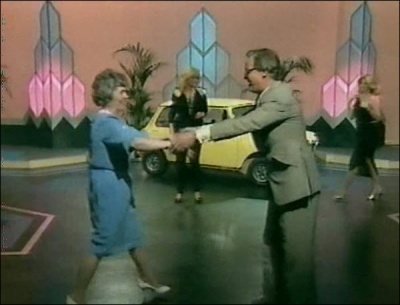 Daphne Fowler (then Daphne Hudson) wins the car
Daphne Fowler (then Daphne Hudson) wins the carReally, your entire opinion of Sale Of The Century depended on your opinion of Nicholas Parsons, as he dominated the show from start to finish. That's because as well as asking the questions, he also took it upon himself to provide a running commentary on every aspect of the show, always telling viewers why he was doing a particular thing ("I read out the contestants' scores because although they know how well they're doing, they don't always know about their opponents' scores, and they need to know!"), badgering the contestants into buzzing in ("Any good East Anglian should know this!"), and launching into lengthy and effusive praise over each of the prizes (when nobody wanted to buy the tyres on offer, Nick spent ages moaning about how good they were). During the final big sale, he spent ages talking rubbish about each prize, like an embryonic QVC presenter, even when the contestant clearly didn't want it or couldn't afford it - most famously "Would you like a mink coat, Elizabeth? I say, would you like a mink coat, Elizabeth! Would you!?!".
Indeed, this sums up the major flaw in the format - Elizabeth couldn't have the mink coat, or any of the other prizes, as she didn't have enough money to buy them, thus meaning she had to come back the following week, and rendering the entire last five minutes of the show completely pointless - not that Nick didn't go through the whole spiel anyway, asking Elizabeth's opinion on prizes she would never have. The contestants were normally so miserable they could never be arsed bidding for any of the prizes, so Nick would just gabble his way through another thousand questions, horrified at there being more than one second of silence on the show. It also seemed that all the cash that had gone on the prizes had been taken out of the show's production budget, with no time or money for retakes, meaning if Nick cocked up, it stayed in - hence, "Women sometimes had their hair cut in... sorry, no! Er, who wrote a symphony..." Eh?
One bizarre aspect of the show was that the price of prizes was often given in pounds and pence, but the scoring system couldn't cope with pence, so it was always rounded up or down to the nearest pound - so why bother with prizes in pence in the first place? Meanwhile, we still haven't worked out whether the mink coat episode from 1972 that seems to be one of the few still in existence (hence why it's wheeled out on all the clip shows) came when the show was originally supposed to be a regional show - Nick announces that the contestants all come from the region, seemingly bigging up the local aspect, though it appeared to have been at least part-networked at the time. So God alone knows what viewers outside the Anglia region made of it all.
Schedule spotting
The programme was originally supposed to be a regional show on Anglia, but since 8 January 1972 it spread to other regions such as ATV, where it was on Saturday teatimes. Some of the northern ITV stations held out longer, preferring to air Yorkshire's The Sky's the Limit, but Sale was aired across nearly the whole network by the end on 10 May 1975, when it made the Top 20 ratings for the first time. Then it tended to flit around Friday (ITV's favoured quiz slot) and Saturday evenings, although some regions bunged it out nearer teatime. By 1976 it was topping the ratings, with regular outings on Christmas Day and Bank Holidays. The episode broadcast on Friday 22nd December 1978 remains not only ITV's highest-rated quiz show ever, but also one of the highest-rated programmes of any kind, with an audience of 21.2 million people. However, the BBC were on strike at the time, meaning it was Nick or nothing.
After this high water mark, the programme went into something of a decline, with ratings dropping and the whole thing looking pretty archaic and unsophisticated compared with more modern series like 3-2-1 and Play Your Cards Right, and it ended in 1983 - a year before a rather different price-based quiz show, The Price is Right, which was light years away from Nick and his tupperware.
The Sky's The Limit
Sale of the Century was one of the cornerstones of The Sky Channel when it relaunched in 1989. Peter Marshall took the host's podium, and there were a few differences to the version from Norwich. All questions were worth £5, and only the show's leader was invited to buy in the various instant sales.
Three times during the show, Peter read out a longer question, beginning "Who or what am I?" and describing a single answer. This style of question, and the fact Peter had an Irish burr, was reminiscent of Henry Kelly on Going for Gold. A correct answer to these longer questions allowed the contestant to pick from nine options - some held actual prizes, others carried money for the game.
The contest ended with a timed round, an on-screen display ticked down 60 seconds of rapid-fire questions. Then the winner was invited to spend their winnings on one of the larger prizes, or to bank them and come back the next day. It's the only way they could afford the show's star prize of a brand new car, that needed at least five daily wins.
The Cheggers Years
The most recent format, shown on Challenge TV for a few years (though as far as we know they only made one series) was rather a blend of the first and second editions of the classic Sale of the Century format. There were six rounds in all. Three contestants started with 15 Sale of the Century pounds, and the game consisted of a sequence of questions each with an assigned cash value. Contestants won this amount by answering questions correctly, or lost it by answering questions wrongly.
We trotted through the rounds at a fair pace. Round one had eight £1 questions. Round two had eight £3 questions, as did round three. Round four had eight £5 questions, but here the questions were reasonably difficult, as opposed to the first few rounds which were all definite jump-ins. Round five had ten £5 five-pound questions, and the last round had 60 seconds' worth of questions for £5 questions of variable difficulty.
After each of the first five rounds, you got an instant bargain - a discounted prize which any player could "buy" by buzzing in. A typical show's prizes might be:
- a £70 rucksack for only £6
- a £80 steam iron for only £8
- a £150 small library for only £14
- a £175 wheeled suitcase for only £17
- a £230 palmtop Casio for just £22
The host, Keith Chegwin (pictured), acted like he was on a permanent sugar rush, but was never objectionable or offensive. Perhaps he had too much fun. A minor quibble was that he didn't run the speed-up round with the pace it needed, even filling in the second half of an answered interrupted question while the clock was still running. He was a lot better with the contestants in their introductions than most around, and gained their confidence quickly.
As ever, a selection of more-expensive prizes were available in the Sale of the Century for the winner, though several shows' earning of SotC£ were needed to win them. Top prize might be a £10,000 family car for 500 of your Sale of the Century pounds, then a £4,700 Australia holiday for £409, a £1,075 pair of mountain bikes for £200-odd, a £500 set of golf clubs for £126, and just snuck in at the bottom a £230 microwave oven for £47.
The set was good but simple. Two quarter-circular doors on a semi-circular path split away to KC's left to reveal the prizes, and the big Sale of the Century doors at the back split open at the end. It was done in tasteful pastel pink and purple, and wobbled entertainingly occasionally. The theme music was a mellow remix of the old British Sale of the Century music, and was rather pleasant. Not terribly aggressive. You'd like it. The opening sequence was American in its simplicity as opposed to the (then) very high-tech graphics of the British '70s original.
It was probably as good as it really could have been, to be honest. There was no accumulating cash jackpot, and no chance to win everything-on-the-stage, but maybe that's where budget considerations started to bite. As an alternative to offering bargain price reductions, it might have been nice to see Keith offer some sterling cash with the bargains as an alternative.
Final round
Looking at it now, Sale Of The Century is a bloody nightmare of a programme, with Nick gabbling furiously trying to fill the void where the contestants' personalities should have been. At the time, though, it was a killer of a series, with contestants leaving with armfuls of prizes of the like never seen before on television. It's also great to see a company like Anglia battling above its weight and producing a durable and popular series that burrowed itself into the public's consciousness. But they were simpler times and now it all looks fairly ridiculous.
Key moments
One of the hostesses in the Peter Marshall version corpsed in this outtake during an Instant Sale advertising a food processor: "Get rid of your grater, part with your peeler, and chuck your chopper because..."
Catchphrases
"And now, from Norwich, it's the quiz of the week!" - delivered by John Benson who also did the voice-overs on Anglia stablemate Gambit at the same time.
Inventor
Devised by Al Howard (see also: Supermarket Sweep)
Theme music
Called "Joyful Pete" (in tribute to the show's original producer, Peter Joy) and composed by Peter Fenn.
Trivia
The Independent Television Authority watchdog reprimanded the programme in 1971 because it thought the show "gloated over the high value of its prizes too much".
Originally, the programme was limited to prizes under £1000. When the show started this was no problem because around 15 models of cars cost under that amount. However, four years later inflation had caught up and only four or five models of cars were available. The newspapers took the show to task, tutting that the star prize was always a foreign car. Anglia explained the situation, and so this because a catalyst for the limit to be upped to £2,500 over three weeks. One week the car was a Lada - one of the first in the country - and he pulled the door off in rehearsal. Parsons made light of Ladas so much that he can be credited with starting the tranche of jokes about them.
An all-out strike at the BBC on 22nd December 1978 meant that 21.2 million viewers watched the programme, the highest ever rating for an ITV game show.
When the original programme stopped in 1983, it had collectively awarded 500 contestants over £500,000 in prizes.
Celebrity editions were run occasionally, with the prizes won going to nominated charities. One example from 1981 featured Tom O'Connor, Nicholas Parsons and Derek Batey as contestants with Steve Jones as the host.
In 2007, The Sun revealed that Simon Cowell was a contestant on the Sky One version back in 1990, and won £20 worth of kitchen utensils for his trouble. Watch Simon Cowell on Sale of the Century
Did you know that the man playing at the organ during the prize descriptions, Peter Fenn, was also Anglia TV's resident managing director?
David Self became the question setter of the Anglia version in September 1976 and continued to set 140 questions for each show each week. If Nicholas didn't get through at least 120 questions, there was little hope of a contestant being able to afford a major prize.
Here's the TV Times listing from October 20th 1972: "A £75 family 'fridge for just £3.75, hi-fi kit for a couple of pounds, a Mediterranean cruise for two for a 'knock-down' £15.50. They're the sort of incredible bargains offered to contestants in this general knowledge quiz. Nicholas Parsons fires questions worth £1, £3 and £5 - and the right answers earn the contestants money to spend on bargains worth up to £1,000 in any one show. At the organ is Peter Fenn."
Countless thousands of programmes have been made of this show. Given the consumerist nature of the format (earn cash, spend money on vastly-discounted prizes), it's not surprising that the original format came from America. The industry juggernaut we call Grundy Television took the format over to Australia, where it debuted in 1980. The highest amount ever won by a single contestant was in 1992 when a 26-year-old university student scooped AUS$676,790, which included a $508,000 cash jackpot - a record win for a quiz show in Australia. Students, eh?
The Gameshow Marathon remake was dedicated to Ronnie Barker, somewhat bizarrely as he never hosted any gameshows, let alone Sale. Having said that, though, there was that superb 'Two Ronnies' sketch in 1985, set in a courtroom with Barker as the defendant and Ronnie Corbett as the prosecuting solicitor. Gameshow references and props brilliantly abounded throughout the sketch: the shows featured included Blankety Blank, Mastermind, Give Us a Clue, Call My Bluff and The Price is Right.
Regional broadcast details
Like many ITV shows of the day, Sale of the Century only gradually rolled out across the network. These are the earliest transmission dates known to us in each region.
Anglia: 9 October 1971
ATV, HTV, Westward, Southern: 8 January 1972
Border: 12 February 1972
LWT, Channel: 19 February 1972
Ulster: 14 July 1972
Yorkshire, Tyne Tees: 13 September 1974
Granada: 27 September 1974
Scottish: 27 October 1974
Grampian: 10 May 1975
Most regions took either The Sky's the Limit or Sale of the Century, and the rollout dates largely represent regions dropping the former to take the latter. However, Southern showed both until Limit ended in 1974, and London viewers got to see Sale on LWT and Limit on Thames.
Web links
See also
Weaver's Week review of the 1989 revival, written in 2014.

